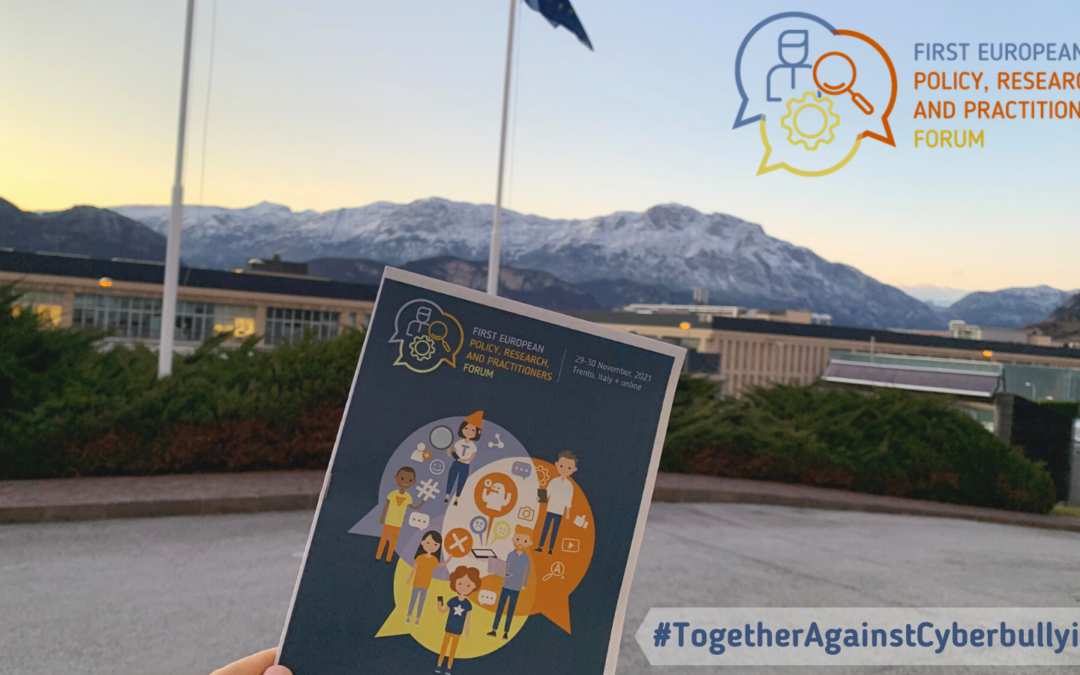Contributors: Andrea Malena, Youth for Exchange and Understanding (YEU), Rita Marques, Youth for Exchange and Understanding (YEU), Sophie Smit, European Schoolnet (EUN).
Last week the first KID_ACTIONS EU Policy, Research and Practitioners Forum took place, marking the first half of the KID_ACTIONS project. More than 70 people attended the event onsite in Trento and online, the participants came from over 10 countries. The participants represented a wide area of sectors, such as research and academia, NGOs, Education and Training, Public Administration, Police Authority and Industry and SMEs. The two days focused on discussions and exchanges between the experts, educators, professors, and professionals. Their input will be used in the second half of the KID_ACTIONS project.
The first day kicked-off with the presentation of the existing research on cyberbullying, by Dr. Veronica Donoso, from EUN. Following this, a panel reacted to the presented research findings. The panel was moderated by the scientific coordinator of the KID ACTIONS project Sara Tonelli (FBK), who was joined on stage by Prof. Valerio Basile (University of Turin), Prof. Anita Lavorgna (University of Southampton), Dr. Davide Cino (Università Cattolica del Sacro Cuore, Milan) onsite, and Prof Federico Faloppa (University of Reading), Dr Michelle O’Reilly (University of Leicester) and Prof. Heidi Vandebosch (University of Antwerp), online. The experts were able to share their research, the experiences they have had and the work they have done so far, in their respective fields. Alex Holmes, deputy CEO of The Diana Award, closed the day with a keynote speech. Alex stressed the importance of approaching cyberbullying as a global problem, not a country approach. There is a need for platforms and academics to work together. Additionally, he urged for more pressure on governments to invest in educational programs and mental health. He mentioned the success of peer-to-peer programs, young people can shape attitudes and change behaviors. He closed the talk with an anagram that people can use before they say something online: T.H.I.N.K. (T = is it true, H = is it helpful, I = is it inspiring, N = is it necessary, K = is it kind).
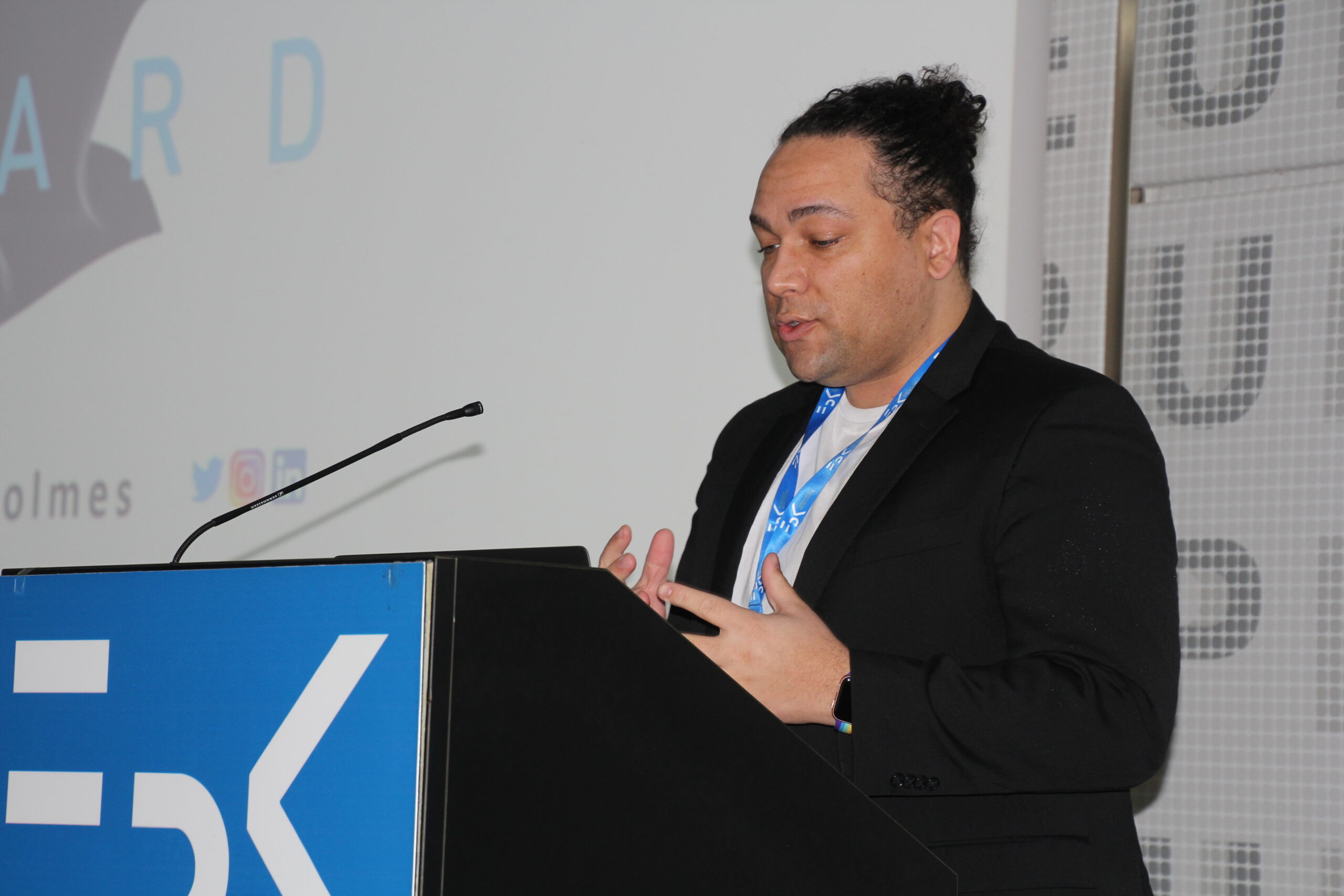
Image: Keynote address by Alex Holmes, Deputy CEO at The Diana Award.
In the second day of the Forum, work was divided into two main sessions: the Deep Dive Session, where the KID_ACTIONS Digital Education Platform and Educational Toolkit were presented and discussed; and the Stakeholder Roundtable, that aimed at matching KID_ACTIONS outputs with stakeholders’ needs. During the Deep Dive Session, held by Alessio Palermo Aprosio, Enrico Maria Piras (FBK) and Gareth Cort (EUN), participants and the audience were asked to give user inputs into the design and development of the Digital Education Platform and Training and Educational package. In particular, the digital platforms presented were KAMoT, Rocket Chat, Creender, Hatemeter and High School Superhero.
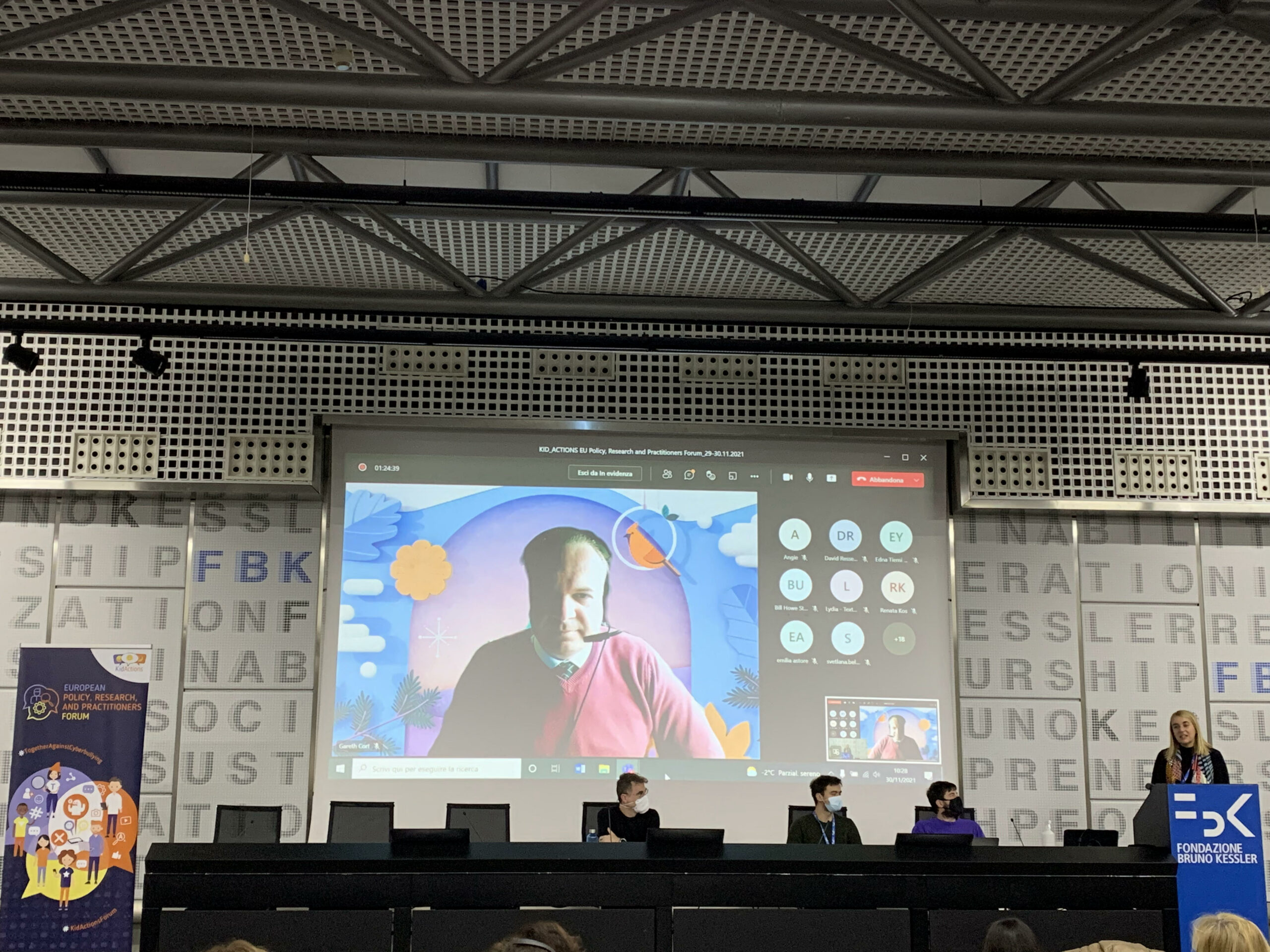
Image: Deep dive session: The KID_ACTIONS Digital Education Platform and Educational Toolkit. Speakers: Alessio Palmero Aprosio, Enrico Maria PirasGareth Cort. Moderator: Sabrina Vorbau.
As far as the Stakeholders Roundtable is concerned, the following panellists were invited: Dorotea Riccobono (teacher from the Autonomous Province of Trento); Claudia Matera (ALL DIGITAL); Lydia El-Khouri, (Textgain); Laura Higgins, (Roblox); Debora Barletta, (No Hate Speech Movement Italy); Sara Cerretelli, (COSPE); Caridad Alarcón Sanchéz (OBESSU); and Angie Wright & Bill Howe (StopHate UK).
Several suggestions were made to further shape the KID_ACTIONS educational toolkit. The participants emphasized that the toolkit should be based on scientific evidence. The whole-school approach is key in combating cyberbullying – to be successful all levels of society should be involved. Next, the tools should be simple, technical and non-technical, and directed to change behaviour in a positive way. Adults should be taught how to react to cyberbullying in a proper way. Last, it is necessary to give attention to the heterogeneity of children and young people as a group. Not all children and young people will react the same to cyberbullying, the role of personalities and different contexts should not be underestimated.
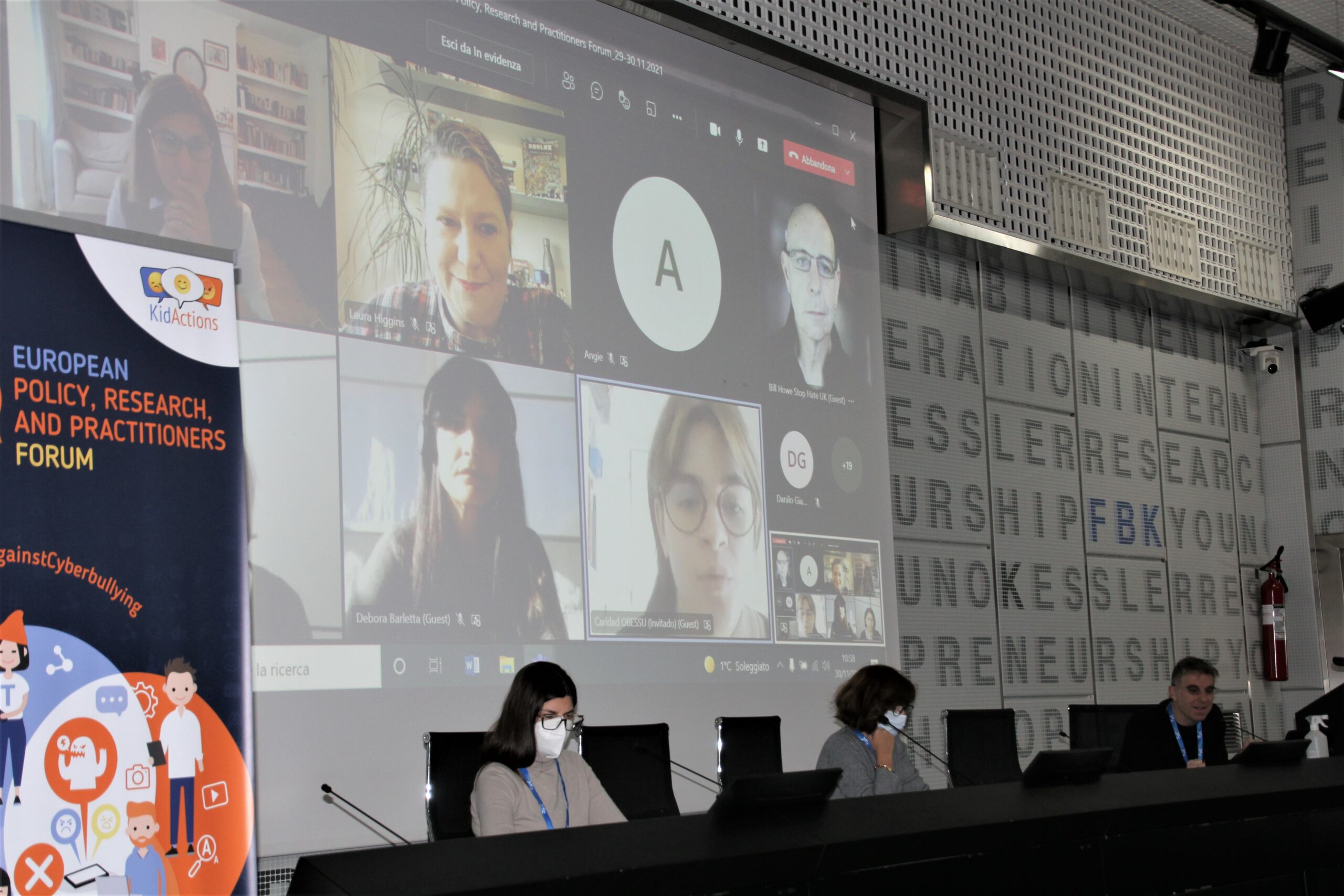
Image: Stakeholder Roundtable – how can KID_ACTIONS outputs meet stakeholders’ needs? Panelists: Dorotea Riccobono, Claudia Matera, Lydia El-Khouri, Laura Higgins, Debora Barletta, Sara Cerretelli, Caridad Alarcón Sanchéz, Angie Wright, Bill Howe. Chair: Enrico Maria Piras.
During the forum, several challenges were mentioned in identifying, combating and preventing cyberbullying. One of the main challenges in the fight against cyberbullying are the difficulties in the detection of cyberbullying. Cyberbullying is often implicit and indirect and sometimes cyberbullying acts are not universally hurtful but can vary across cultures. The support of technology and artificial intelligence (AI) can be a great contribution to identify and respond to cyberbullying. AI and technologies can detect new threats, words, hashtags, trends related to the topic and create disclaimers. However, it is important to merge this technology with human presence, sensitivity, and experience. Moderation of contents is a good example of how technology and human intervention can be successful and effective. Gamification can be another example of using technology to fight cyberbullying. Videogames can provide an interactive experience for youth that can be used to stimulate positive behaviour online.
A second issue is the limitations and gaps in existing research. Often, research on cyberbullying is mainly descriptive and geographically contained. Further, researchers should include children from younger ages in their approaches and methodologies since cyberbullying is also present among younger children.
The path to more valuable research lies in cooperation between different fields and conducting research in an interdisciplinary manner. There is a call to social media companies to share their data with researchers to pinpoint more precisely where, when and how cyberbullying takes place. Additionally, long term impacts of implemented programmes against cyberbullying need to be measured. Besides that, the use of multi-methods in research can tackle issues of ethics and privacy.
Lastly, researchers should focus on the root causes of cyberbullying, the underlying motivations in behaviour. Oftentimes there is too much attention for the effect of cyberbullying and too little for identifying factors that contribute to cyberbullying behaviour. It is important to try to construct counter and alternative narratives. To reach this, the following steps were mentioned: ask the right questions, help young people to find tools that enable them to find answers on their own and try to avoid polarization and oversimplification.
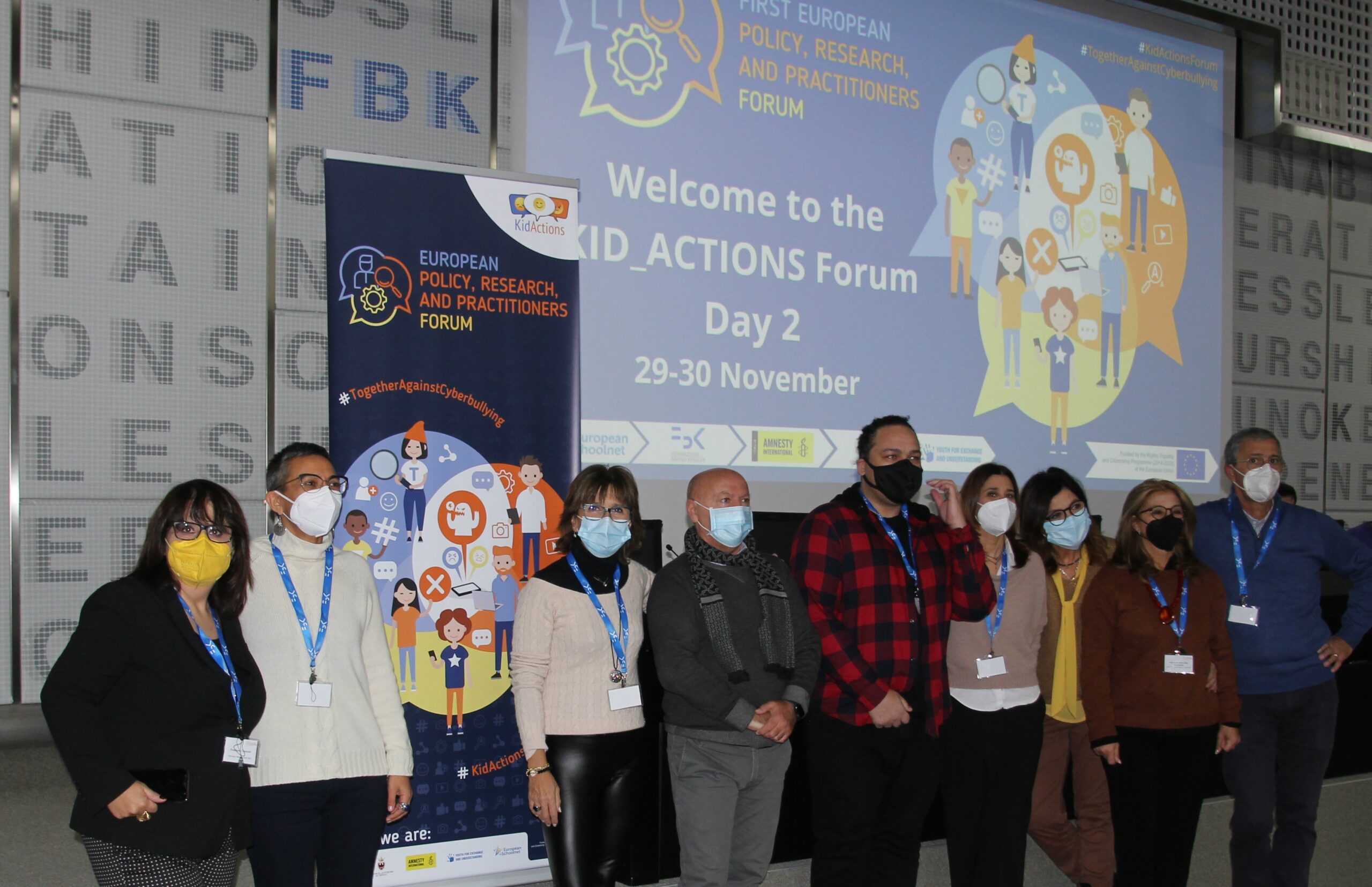
Image: Onsite participants of the KID_ACTIONS Forum in Trento, Italy.
Another important challenge mentioned in the forum is the need for intergenerational support to teach youth how to use social media in the right way. This is now more important since the COVID 19 outbreak exacerbated the situation. Children and young people can be more exposed to cyberbullying by spending more time online. However, there is a great amount of work that has been done and it is currently being done, and this forum proved it. Moreover, online spaces and technologies do not necessarily need to be a threat, but it can be conceived as a space and place where learning processes may occur. Pupils can learn here what can be threatening, dangerous, intimidating but also the opportunities of online environments.
To conclude, adults and societies need to be involved more in the fight against cyberbullying. Often it is difficult for adults to truly understand the phenomenon. Even though cyberbullying is an issue that is mostly related to young people, it is not a problem of young people alone! Every single sector (private, public and third sector) in every single context and setting (formal and non-formal) need to work together at any age in order to raise awareness, prevent and combat cyberbullying.

